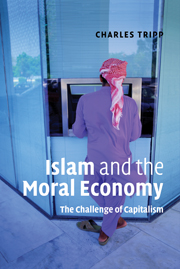Introduction
Published online by Cambridge University Press: 08 January 2010
Summary
Vivid but contrasting images come to mind when considering Islamic responses to capitalism. The burning towers of the World Trade Center in New York in September 2001 have become powerful icons of the early twenty-first century, representing for some a violent rejection of the power of global capitalism at the heart of its main marketplace by Muslims who believed they were doing the work of God. Yet images of a different kind of response, less shocking but more substantial, have long been available. Since the 1970s the financial press and then the global media have reported extensively on the rapid growth of Islamic banks and on the opening of Islamic banking facilities by bastions of conventional capitalism such as Citibank and Chase International. Here too the initiative has been justified with reference to distinctively Islamic injunctions.
Both cases, radically different as they are, represent forms of engagement by Muslims with a world shaped by industrial capitalism. Furthermore, both owe much to distinctive debates during the past fifty years or so among Muslim intellectuals who have developed contrasting answers to the question of how a Muslim should act in the world. Those for whom these actions had meaning – self-immolation in an act of merciless violence or the pursuit of ethically sanctioned profit – can draw upon a repertoire of Islamic terms, narratives and prescriptions familiar to many, but assembled in particular combinations according to a logic that is not exclusive to Muslims, let alone to an abstracted ‘Islam’.
- Type
- Chapter
- Information
- Islam and the Moral EconomyThe Challenge of Capitalism, pp. 1 - 12Publisher: Cambridge University PressPrint publication year: 2006



